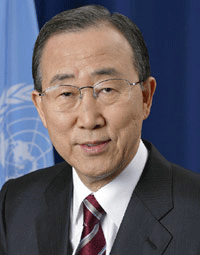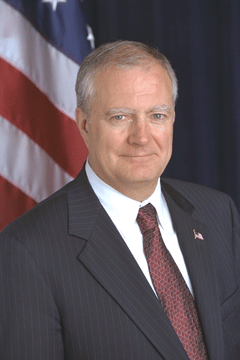Dueling Climate Conferences?
Air Date: Week of September 21, 2007

The Ole’ Blue Marble, with coastlines still intact.(Photo: Reto Stoekli, NASA Goddard Space Flight Center)
Both the United Nations and the White House will sponsor special conferences on climate change, as the world's leaders ponder future global warming agreements. Living on Earth's Jeff Young reports that two sharply different visions will be on display: President Bush's voluntary approach versus mandatory emissions reductions.
Transcript
CURWOOD: It’s Living on Earth. I’m Steve Curwood. Global warming is topping the agenda as the United Nations General Assembly opens in New York on Sept 26, and later in the week in Washington, President Bush is hosting diplomats from the world’s major economies for a global warming conference. All this comes as the UN negotiators prepare to meet in Bali in December to hash out what might replace the Kyoto Protocol, which expires in 2012.
Kyoto calls for the rich industrialized nations to reduce their emissions first and help developing countries constrain emissions in the future. Living on Earth’s Washington correspondent Jeff Young takes a look at what’s at stake for the meetings in New York and Washington.
YOUNG: The United Nations says its one-day event will be the largest-ever meeting of world leaders on climate change, with more than 70 heads of state. UN Secretary General Ban Ki-moon knows the clock is ticking on the Kyoto Protocol and reaching a new agreement will take time. He’s not happy with the pace of talks so far.
KI-MOON: We need to move fast and reach a bold agreement by 2009 so that it can enter into force by the end of 2012.

Secretary of the United Nations, Ban Ki-Moon.(Courtesy of the United Nations)
YOUNG: After the UN meeting, climate action moves to Washington where President Bush has asked the leaders of the world’s major economies to the White House. Bush says he, too, wants to help forge a new climate framework.
BUSH: So my proposal is this: By the end of next year America and other nations will set a long-term, global goal for reducing greenhouse gases. To help develop this goal, the United States will convene a series of meetings of nations that produce most greenhouse gas emissions, including nations with rapidly growing economies like India and China.
YOUNG: It was a surprising invitation from an administration that takes a lot of heat on global warming. Critics say the White House ignores the science on climate change. But the president’s top science advisor begs to differ. John Marburger directs the White House Office of Science and Technology Policy. Marburger says the president agrees with the scientific consensus that the climate is changing and that human activity is most likely the cause.
MARBURGER: There’s no question that the president himself has embraced the appropriate scientific findings regarding climate change almost from the beginning of the administration. He says the earth is warming and we’re producing too much CO2, we need to take responsibility for our emissions. And he understands it. The policies are being made in the context of a much higher level of understanding of the science than I think most people are aware.
YOUNG: Is the White House stance on climate change changing? Massachusetts Democratic Senator John Kerry says he doubts it.
KERRY: Is it better that they are finally talking the language of saying
‘we accept the science, or we see global climate change?’ Yes, of course. This has been a 7-year struggle with this administration to get them where they should have been 7 years ago. So I’m not going to jump up and down over the fact of the conference until we see what the outcome is, obviously.
YOUNG: Kerry cosponsors a bill before Congress that would put a mandatory cap on U.S. carbon emissions. He says most of the world’s developed countries already limit CO2. And he thinks binding mandatory reductions should be the basis for the next international agreement. Kerry worries that the White House conference’s emphasis on voluntary measures could make it tougher for the UN to get deeper carbon cuts.
KERRY: There is a concern about this White House undermining efforts on a global basis; they’ve done that everywhere they’ve been. This administration has been a rigorous opponent of responsible action on global climate change.
YOUNG: Officials at the White House Council on Environmental Quality were not available for an interview. The council’s spokesperson offered a written statement that says, ‘Not only does this process have the support of the G8 leaders but we have the support of the UN Secretary General and the head of the UN Framework Convention on Climate Change. White House science advisor Marburger also defends the U.S. approach to climate.

John Marburger, chief Science Advisor to President Bush.(Courtesy of White House Office of Science and Technology Policy)
MARBURGER: People have been hung up on this issue—whether it’s
happening or not, or whether there should be caps, or what the targets should be. And the U.S. has just gone ahead and invested in these technologies. I feel more comfortable about actions that the U.S. has taken than I do about much of the rest of the world because we are investing in new energy technologies, which is what is necessary.
YOUNG: Marburger says sharing new energy technology will draw countries like China into a climate agreement. But Elliot Diringer at the Pew Center on Climate Change says mandatory carbon cuts would do more to actually get the clean energy technology into use.
DIRINGER: The White House has used terms like ‘aspirational,’ ‘bottom up,’ ‘pledge and review’—all of those mean ‘voluntary.’ What has now come to fore is really sharply contrasting visions of the future climate framework: will it be built primarily on voluntary actions or will it entail or involve some form of binding commitments?
YOUNG: The coming week could show which path world leaders want to take. For Living on Earth, I’m Jeff Young in Washington.
CURWOOD: You can hear more of Jeff Young’s interview with President Bush’s top science advisor at our website: l-o-e dot org.
Links
UN climate conference agenda and background
US State Dept. page on the White House climate conference
White House office of Science and Technology Policy
National Academies report on effectiveness of White house climate science program
Listen to an extended interview with President Bush's top science advisor, John Marburger.
Living on Earth wants to hear from you!
Living on Earth
62 Calef Highway, Suite 212
Lee, NH 03861
Telephone: 617-287-4121
E-mail: comments@loe.org
Newsletter [Click here]
Donate to Living on Earth!
Living on Earth is an independent media program and relies entirely on contributions from listeners and institutions supporting public service. Please donate now to preserve an independent environmental voice.
NewsletterLiving on Earth offers a weekly delivery of the show's rundown to your mailbox. Sign up for our newsletter today!
 Sailors For The Sea: Be the change you want to sea.
Sailors For The Sea: Be the change you want to sea.
 The Grantham Foundation for the Protection of the Environment: Committed to protecting and improving the health of the global environment.
The Grantham Foundation for the Protection of the Environment: Committed to protecting and improving the health of the global environment.
 Contribute to Living on Earth and receive, as our gift to you, an archival print of one of Mark Seth Lender's extraordinary wildlife photographs. Follow the link to see Mark's current collection of photographs.
Contribute to Living on Earth and receive, as our gift to you, an archival print of one of Mark Seth Lender's extraordinary wildlife photographs. Follow the link to see Mark's current collection of photographs.
 Buy a signed copy of Mark Seth Lender's book Smeagull the Seagull & support Living on Earth
Buy a signed copy of Mark Seth Lender's book Smeagull the Seagull & support Living on Earth

